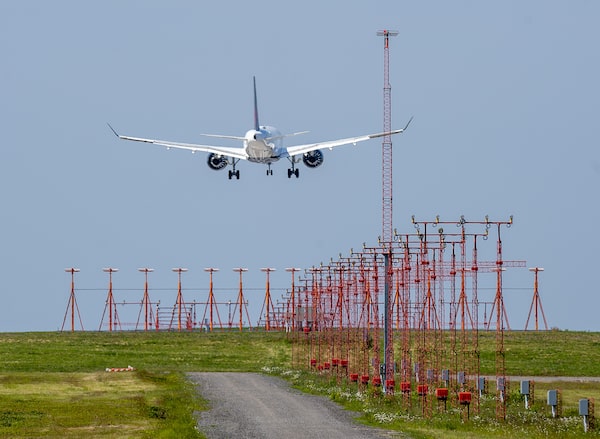
An Air Canada Airbus A220-300 airliner from Toronto arrives at Halifax Stanfield International Airport in Enfield, N.S. in June, 2021.Andrew Vaughan/The Canadian Press
The premiers of the four Atlantic provinces say proposed changes to the rules that dictate how airlines treat passengers when flights are delayed or cancelled will unfairly burden the carriers and lead to reduced services in Eastern Canada.
The federal government introduced planned changes to the Air Passenger Protection Regulations last year that would broaden the circumstances in which passengers are owed compensation for delays, and place the burden on airlines to show why disruptions are outside their control. The amendments would also give passengers the right to refunds if their flights depart at least three hours late.
In a recent letter to federal Transport Minister Pablo Rodriguez, the Atlantic leaders warn that the changes under consideration would drive up seat prices as airlines try to recover the higher costs of complying with the law. The costs might also discourage airlines from offering or expanding flights at some smaller regional airports, the premiers say.
The letter, dated Jan. 12, was sent by the Council of Atlantic Premiers, a group that is chaired by Newfoundland and Labrador Premier Andrew Furey. Its other members are Dennis King, Premier of Prince Edward Island; Tim Houston, Premier of Nova Scotia; and Blaine Higgs, Premier of New Brunswick. The council posted the letter to its website on Jan. 22.
The proposed changes to the so-called passenger bill of rights include requiring smaller airlines to rebook passengers on other airlines in the case of certain kinds of disruptions. But many smaller airlines in Atlantic Canada are the only available carriers in their areas, and some of them operate in especially harsh winter conditions.
“While these and other proposed changes are intended to protect passengers and improve air travel quality in Canada, they are particularly challenging in the context of servicing passengers in regional markets and do not recognize the distinct issues associated with flight frequency and availability in smaller market centres,” the letter says.
“We are concerned that the proposed regulatory changes are likely to mean even further increased costs for Atlantic residents as airlines look to recoup the costs of regulatory compliance. It may also result in airlines becoming hesitant to continue, resume or provide service to regional markets, ultimately limiting regional air accessibility for passengers.”
Laura Scaffidi, a spokesperson for Mr. Rodriguez, said the new rules will protect passengers while recognizing the operational differences at regional and remote airports. “Canadians work hard and save up to travel,” she said. “Airlines need to do better for Canadians.”
The premiers’ letter comes at a time of last-minute lobbying before the draft changes are published in the Canada Gazette, a government publication. The changes will become law after a period of consultation. The government has not set a timetable for this.
The passenger protection rules, introduced in 2019, outline standards of care – food, lodging, refunds and compensation – to which passengers are entitled if their flights are late or cancelled, or their luggage is lost. For instance, a traveller is owed $1,000 if their flight is nine or more hours late for a reason that is within the airline’s control.
Critics of the current regulations say they are tilted in favour of the airlines, which are allowed to dodge refunds by claiming disruptions are related to safety. This led to a backlog of more than 50,000 passenger complaints last fall at the Canadian Transportation Agency, which adjudicates these claims.
The Canadian Automobile Association, which operates a travel agency, is among the groups pushing for changes to the rules.
Ian Jack, a spokesperson for the CAA, said the group supports clarifying the rules and making it easier for passengers to claim what they are owed by airlines.
“We think it is possible to do that without unfairly impacting carriers,” Mr. Jack said. “We’ve said from the start that we need a viable competitive airline industry in this country because that also gives consumers more choice at better prices. And we think it’s very possible to do both.”
 Eric Atkins
Eric Atkins